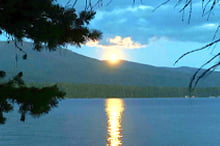No products in the cart.
Pioneers in the Dark

What Became of Them?
By Marcia McGreevy Lewis
Little things made us feel the shadowy presence of our predecessors at the cabin. They left behind chipped dishware, knife handles made from deer horns, and mustache cups as drinking mugs. We pictured swarthy people with dense facial hair. The stereoscope they left fascinated us. We gazed through the lenses at side-by-side pictures that morphed into a 3D image. Elegant ladies in bustled gowns and gentlemen who drove Model Ts appeared before our eyes.
They also handed down larger legacies, like the weathered black leather couch with its clumpy horsehair stuffing and river of cracks. A foot-pedaled grinding wheel for sharpening knives and axes led us to imagine the former owners as swashbuckling pirates posturing with their swords or perhaps backwoodsmen hoisting their hatchets. The chamber pots they left received lots of use since the outhouse was at the end of a cold, dark walk in the moonlight.
Wind whistled through the cracks in the logs like an apparition screaming to get in. We often heard scampering footsteps softer than those of the pack rats that ruled the attic, which made us conclude they were ethereal. The nocturnal smells of skunk spray tormented us. We assumed the skunks were aiming their odiferous weapons at the apparitions every night when they roamed. Every day we wondered what spectral phenomenon would grab us and carry us away.
The former owners of our cabin had long since abandoned it. It was their choice, we had nothing to do with it, but they seemed to be haunting us. What did they want? Did they have unfinished business? We had to acknowledge their existence, because upon their mysterious disappearance they had left behind the detritus of their lives.
We were endlessly curious about them. My siblings and I made up wild stories that both petrified and intrigued us. Had they left because of some trauma? Did they all get sick and die right there in the cabin? Were bodies buried beneath the floorboards? Why did they leave everything behind? Did they blame us for having displaced them? Were they angry enough at us that they sent the spiders that spun webs in our suitcases and the bugs that bit our ears while we slept? When we smelled the gag-inducing skunk stink at night, we were certain our predecessors were just outside the door, hunting us down, making us pay for taking over their lives.
This content is available for purchase. Please select from available options.
Register & Purchase Purchase Only
Register & Purchase Purchase Only


One Response to Pioneers in the Dark
Sandra Carlson -
at
Just returned from our annual Priest Lake stay with family and friends; now 68 years for me. Fun to visualize every place and experience you passionately describe.